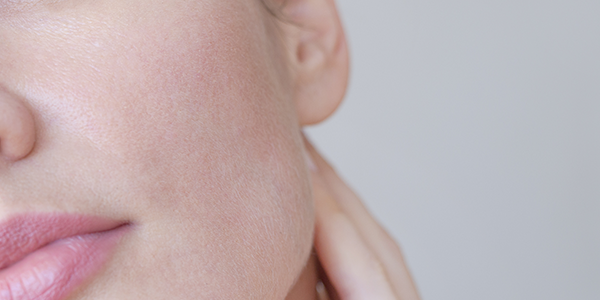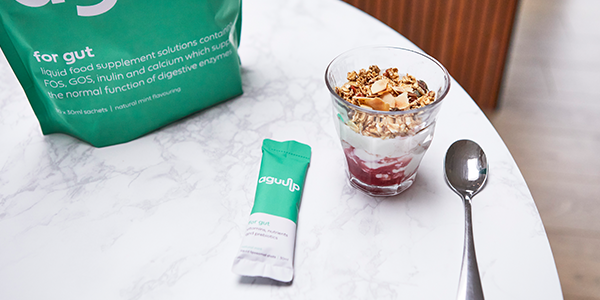What Is The Gut-Skin Axis?

Have you heard of the gut-skin axis? Your gut microbiome, skin health, and what you eat are all linked; as a surface level organ, your skin can often act as a mirror for the state of your internal health, and a growing amount of evidence suggests that this is specifically true in regards to your gut health.
Dermatological problems such as eczema, rosacea, and acne may directly correlate with gut issues and abnormal intestinal flora, such as insufficient numbers of lactobacilli and bifidobacteria or intestinal wall permeability, a.k.a leaky gut (1).
If you’ve tried the miracle creams and 7-step skin care routines without any luck, it might be time to focus your attention inwards and pay your gut-skin axis some much needed attention. A truly healthy gut can give your skin a look and feel that no amount of topical creams or serums can hope to replicate.
Let’s get into the details of what the gut-skin axis is, and explore the best foods for skin and gut health.
Understanding the gut-skin axis (2)
So, what is the link between your gut microbiome and skin health? This connection is known as the gut-skin axis. Here’s what you need to know…
1. Nutrients absorbed and produced in the gut have a direct effect on the skin. For example, your gut flora is responsible for producing key nutrients for skin health, such as hyaluronic acid (yes, that’s the same acid that’s in your must-have creams!) and biotin.
2. The nutrients absorbed and the gut bacteria absorbing it can stimulate hormonal changes that affect the skin. Your gut bacteria plays a role in cortisol levels, oestrogen levels, and more!
3. The gut microbiome affects the immune system, which in turn, can affect the skin. An imbalance in intestinal gut flora (called ‘dysbiosis’) through exposure to antibiotics, toxins, or other stressors can reduce beneficial flora in the gut and skin, making your risk of gut and skin issues far higher.
4. The release of metabolites in the gut microbiome has an effect on the skin.
5. Intestinal hyperpermeability, also known as leaky gut, can result in food sensitivities, as proteins from foods enter the bloodstream and cause an immune response, which causes systemic inflammation as well as inflammation in the skin. This can be why gut health and acne are often linked.
How to support your gut-skin axis
To support your gut-skin axis, you need to feed your good gut bacteria – especially lactobacilli and bifidobacteria (10 different bacterial strains are found in our Gut Probiotic). To encourage good bacteria to thrive in your gut, so it can multiply and improve your gut microbiome, skin health, and more, you need to provide them with the right fuel, such as prebiotic soluble fibre – this is especially abundant in plant foods.
In addition, some bitter plants, such as artichokes, are also very beneficial for gut health, and can help to stimulate the liver and gallbladder function, supporting the process of digestion.
What are the best foods for skin and gut health?
You can also support the gut-skin axis through your diet. To maintain a radiant appearance, it is important to understand what foods your gut does and doesn’t like.
The list of worst foods for gut health typically includes:
- Low fibre, processed foods
- Highly sugary foods
- Saturated fats
- Foods with a excessively high protein content
- Alcohol
- Additives (found in highly processed foods, such as prepared meals, sauces, etc.)
- Certain medications such as antibiotics and laxatives
In contrast, some of the best foods for skin and gut health and nutrition tips include:
- Soluble fibre from fruits, vegetables, legumes and whole grains
- Bitter plants, such as artichokes
- Fermented foods and drinks, such as sauerkraut, kimchi or kombucha
- Foods rich in vitamins A, B2, niacin, biotin to support healthy mucous membranes
- Drink plenty of water or unsweetened herbal tea
- Steam or slow cooked meals to retain maximum nutrients
- Proper chewing and calm, mindful eating to aid digestion (say no to eating in a rush)
How to support your gut-skin axis with supplements
There is some evidence to suggest that taking probiotic gut health supplements may help to support the gut-skin axis. Probiotics appear to be an effective treatment for certain inflammatory skin diseases (3), according to a 2020 review of the literature published in the British Journal of Dermatology.
Meanwhile, a 2015 review published in the International Journal of Women’s Dermatology confirmed that “the use of probiotics for acne and anti-aging is clearly mounting”, and that probiotics can support skin health on many levels, including skin protection (4).
Probiotics have also been shown to help Atopic dermatitis, Acne vulgaris, Psoriasis vulgaris, Rosacea, Wound healing and Seborrheic dermatitis (5). So what are the best probiotics for skin and gut health?
Aguulp Gut Probiotic

Our Daily Synbiotic gut health supplements contain 50 billion bacteria, including Lactobacillus, Bifidobacterium, and Streptococcus, as well as prebiotic fibre FOS, XOS, and Inulin. Research shows that when combined, prebiotics and probiotics make a dream team for healthier skin!
Lactobacillus Rhamnosus is especially recommended for people with dry skin, to help maintain the pH balance of the skin and promote the production of lactic acid (6). Meanwhile, Bifidobacteria are known for their anti-inflammatory properties, which can be helpful to people with sensitive skin and rosacea. If you want to support your gut-skin axis better, this is a great place to start.
Aguulp for Gut
Aguulp for Gut is a powerful prebiotic blend that’s a feast for your good gut bacteria and also contains a number of important gut-supporting nutrients, such as L-Glutamine, L-Lysine, selenium, zinc, and most notably for skin health, marine collagen, which is famed for its rejuvenating and healing effect on skin, tissue and joints. It also helps reduce intestinal inflammation. Read more about collagen for gut health.
What our customers are saying…
“I suffer with persistent psoriasis all over my body and it’s now beginning to heal and fade!” – Karen DS
“After 2 to 3 months…this amazing product fixed my cystic acne!” – Emma
Shop our full range of gut health supplements to find products to help you take better care of your gut-skin axis.
Sources:
(1)Salem I, Ramser A, Isham N, Ghannoum MA. The Gut Microbiome as a Major Regulator of the Gut-skin Axis. Front Microbiol. 2018;9:1459. doi:10.3389/fmicb.2018.01459
(2)Sivamani, R (2018)The Gut-Skin Axis and Mechanisms for Communication. Natural medicine journal. Vol. 10 Issue 81 https://www.naturalmedicinejournal.com/journal/2018-08/gut-skin-axis-and-mechanisms-communication
(3)Yu Y, Dunaway S, Champer J, Kim J, Alikhan A. Changing our microbiome: probiotics in dermatology. Br J Dermatol. 2020 Jan;182(1):39-46. doi: 10.1111/bjd.18088. Epub 2019 Jul 28. PMID: 31049923. https://pubmed.ncbi.nlm.nih.gov/31049923/
(4)Kober MM, Bowe WP. The effect of probiotics on immune regulation, acne, and photoaging. Int J Womens Dermatol. 2015 Apr 6;1(2):85-89. doi: 10.1016/j.ijwd.2015.02.001. PMID: 28491964; PMCID: PMC5418745. https://www.ncbi.nlm.nih.gov/pmc/articles/PMC5418745/
(5)Bindurani S (2019) Review: Probiotics in dermatology 1(2);66-71 doi: 10.25259/JSSTD_18_2019 https://jsstd.org/review-probiotics-in-dermatology/
(6) L.-C. Lew, M.-T. Liong (2013)Bioactives from probiotics for dermal health: functions and benefits Journal of Applied MicrobiologyVolume 114, Issue 5 p. 1241-1253https://sfamjournals.onlinelibrary.wiley.com/doi/full/10.1111/jam.12137

